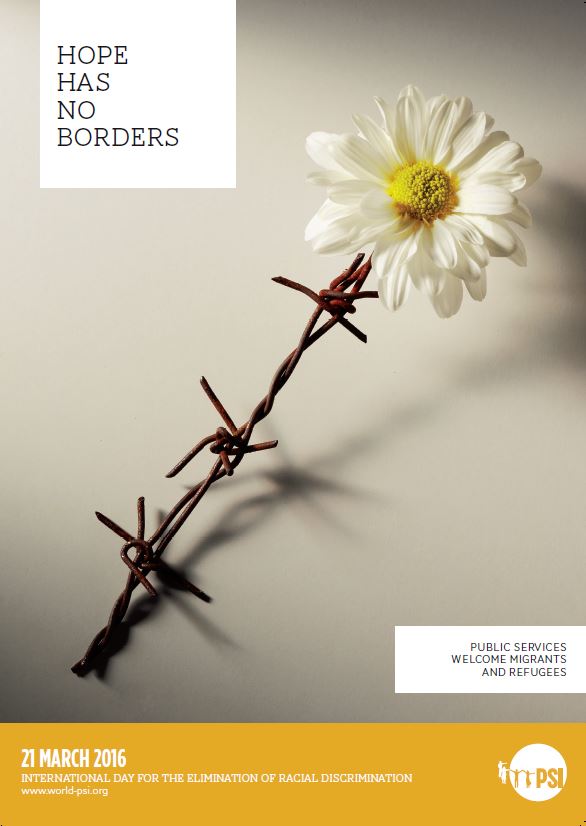United Nations General Assembly High Level Summit on Large Flows of Migrants and Refugees
17 June, 2016
Source:
PSI

In the lead up to the summit, Public Services International urges its affiliates, to:
- Speak to their governments to find out their country’s position and preparation towards the UN High Level Summit. Find out how they plan to engage participation from trade unions and civil society.
- Support UN Secretary General Ban Ki Moon’s call for a “Global Compact for Shared Responsibility for Refugees”, which means committing every country to take its fair share in the responsibility to protect refugees.
In engaging your governments, we encourage you to bring up our key messages:
- Uphold the Rights-Based Approach to migration and refugee flows. States have their obligation to respect human rights and humanitarian law, as provided for in the normative framework of the UN Migrant Workers Convention, the International Labour Organization (ILO) Conventions on Migrant Workers (C97 and C143) and the 1951 UN Refugee Convention.
Operationally, the Rights-Based Approach in addressing the refugee crisis implies: - Protection and reception of refugees and providing them with access to quality public services, primarily the right to healthcare.
- Access of refugees to decent work and social protection for their sustainable integration to society. Currently, the ILO is working on the “Guidelines on Access of Refugees and Other Forcibly Displaced Persons to the Labour Market”, which will provide guidance to governments and social partners to ensure that refugees and displaced persons have access to decent work.
- Safe and decent working conditions for workers at the frontlines. Public service workers are at the frontlines of crisis situations and addressing mass movements of people, arising from natural disasters or conflict situations. These workers provide emergency response, reconstruction efforts, healthcare, social care and all other basic services. Within the ILO, a new instrument is being developed, namely ILO Recommendation No. 71 which will provide the standard to promote employment and decent work in the transition to peace. The instrument includes ensuring safety and decent working conditions for public service workers. Call on your government to support this instrument, which will be adopted by the International Labour Conference in 2017.
- Ensure funding of public services and providing adequate staff. This includes addressing the global shortage and unequal global distribution of healthcare workers, either through sound retention strategies or international recruitment based on international norms and standards.
- Furthermore, in order to provide access to public services and ensure inclusion for all migrants, asylum seekers and refugees, it is important to build a “firewall” between public services and immigration control.
 Often, migrants, asylum seekers and refugees are prevented from accessing basic services, particularly health services, for fear of detention or deportation.
Often, migrants, asylum seekers and refugees are prevented from accessing basic services, particularly health services, for fear of detention or deportation. - Condemn deals that allow countries to “outsource” their obligation to humanitarian and human rights law to other countries. The EU-Turkey Deal is one bold example. PSI condemns such forms of agreements; they are immoral and violate human rights and humanitarian law; tolerating mass expulsion, vis-à-vis the right to determination of individual cases, and treating refugees as commodities, i.e. one-in, one-out deal.
- Fight Racism, xenophobia and all forms of intolerance. Work for peace, democracy, inclusion and respect for human rights.
- Address the root causes: Implement the 2030 Sustainable development Goals, fight for tax justice; fair trade, funding of public services and social protection, and promote decent work and decent life for all.

